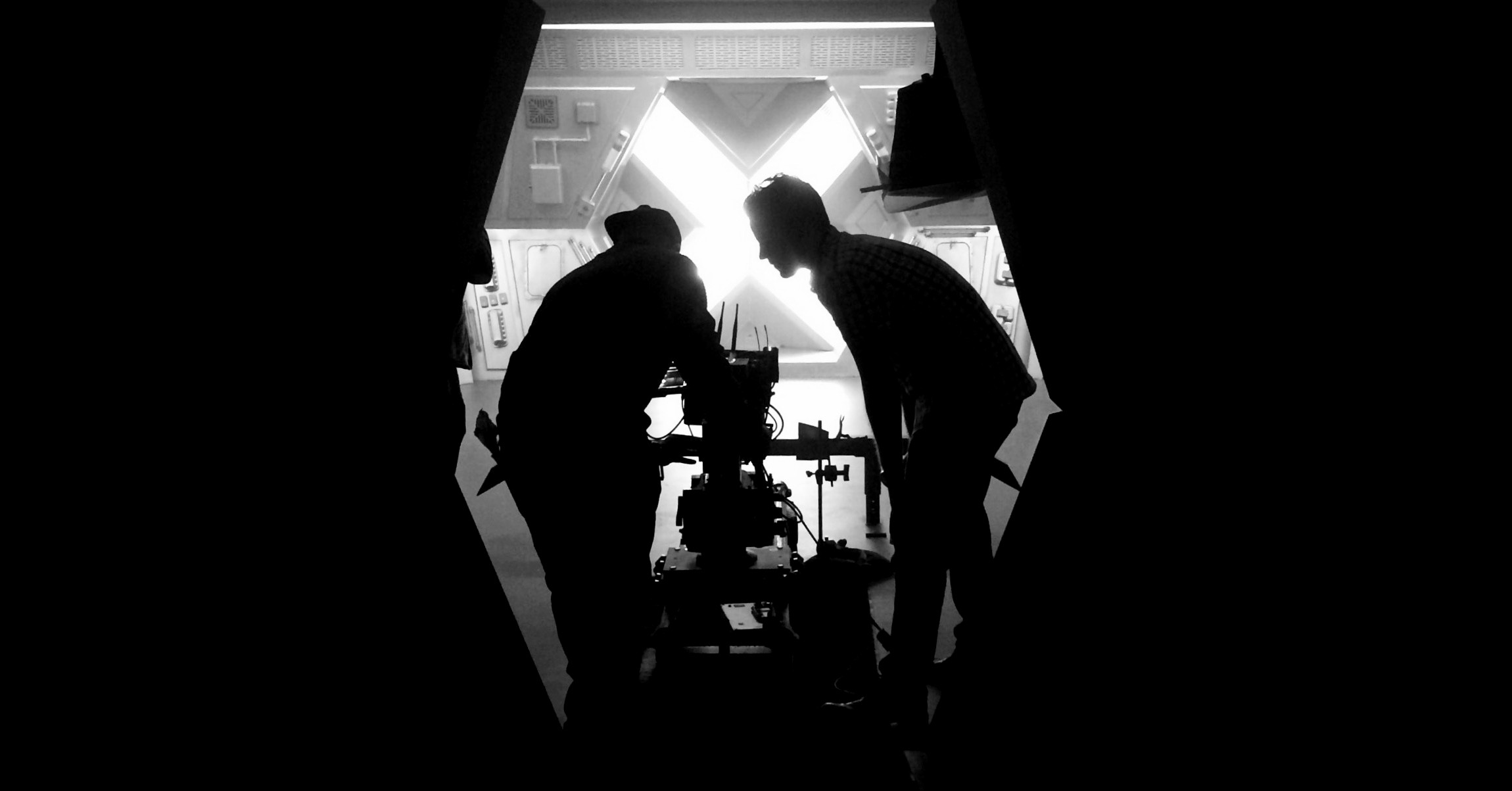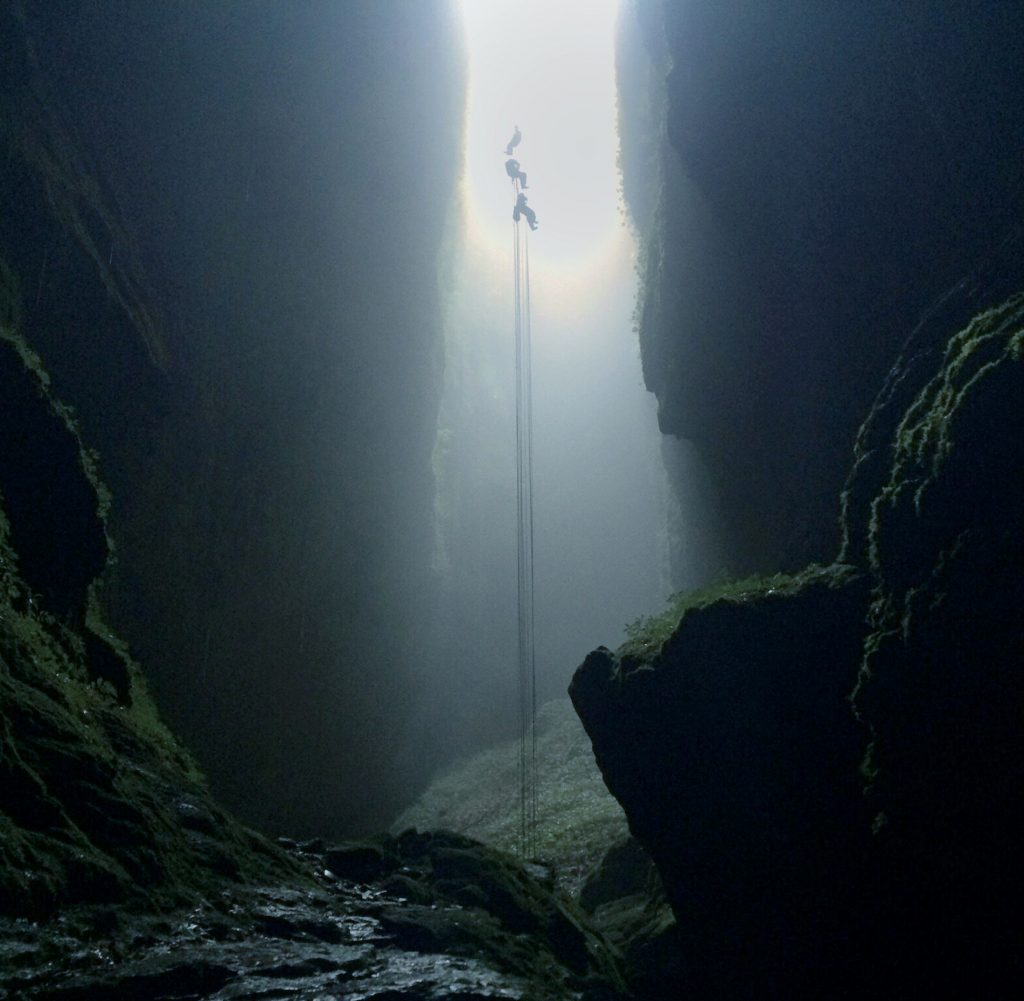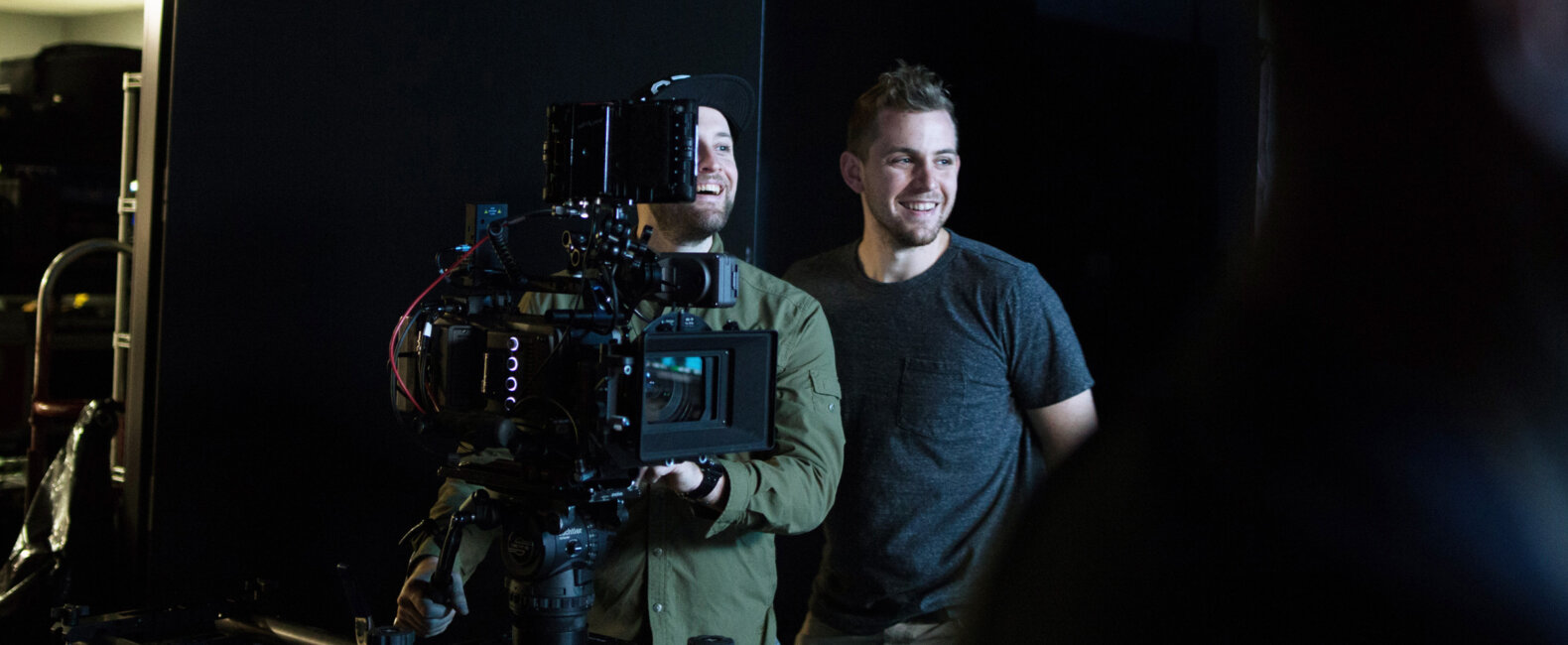The first thing Jesse Edwards tells us when we sit down to talk is that he’s a little sleep deprived. He and his brother Joel, the creative duo behind the Emmy Award–winning production studio Evolve, just got back from a six-day shoot in Portugal, a shoot that involved capturing every sunset and every sunrise. “It was super fun,” Jesse says, describing multiple 30-plus hour days. “The whole crew was having the time of their lives.” It was our first glimpse at the MO that permeates everything Evolve does: enthusiasm, adrenaline, fun. They push their work to new, often dangerous extremes not because that’s what their company has become known for, but because that’s just who they are. They’re the type of guys who jump into glaciers. They get close-ups of lions.
“For me, personally, it’s not calculated or goal driven. It’s just instinctual,” Joel told us. “Your days are numbered. You have to go out and do things.”
And do things they have, creating award-winning films for brands like National Geographic, ESPN, and most recently Disney. Their “throw caution to the wind, stay up until 3 a.m.” attitude has established them as one of the most in-demand boutique studios working today. But, as we see it, it’s their love for each other as brothers, their respect for the people they work with and for, and their childlike enthusiasm for the craft that makes them unlike any other studio we’ve talked to.
Here’s our conversation with Joel Edwards and Jesse Edwards of Evolve.

Have you ever accidentally deleted all of your footage?
Jesse: Yes. We have done that. But what was even worse was when we got shipwrecked and everything we owned sank
No…
Jesse: to the bottom of the Illinois River. That was the point when we probably could have hung it up and got real jobs.
Joel: This was early on. Right before we got the National Geographic job that would really get things going for Evolve. So this was 2010 or 2011, and we were shooting a fishing tournament
Jesse: — It was literally called “The Original Redneck Fishin Tournament.” It’s this event where 50 or 60 boats enter, the people all carry nets, and they drive right next to each other, which really gets the fish going, I guess, because, I’m not kidding, hundreds of fish.
Joel: — Asian carp.
Jesse: Hundreds of Asian carp start jumping into the air. Sometimes like six or eight feet into the air. And these things are huge — 15, 20 pounds. So there’s fish blood and guts everywhere because they’re hitting you in the face. It’s the craziest thing to see and shoot. Plus, there’s a lot of drinking. So anyway, we’d already been shooting this thing for two days, and this was the very last heat of the race.
Joel: We definitely didn’t need to be out there.
Jesse: But the producer was like, “Yeah, just get on the boat.” So we got on, and there’s a bigger boat in front of us that’s making this huge wake. We hit the first wave, and we’re like, “Whoa, that was a close call.” We hit another, we went up really high, and then
Joel: — We went straight in.
Jesse: Straight down into the water.
Joel: We have video of this.
Jesse: You hear someone yell, “Going down!”
Joel: It was a 50-year-old woman wearing a Confederate flag bikini.
Jesse: We had $20,000 or $30,000 worth of equipment with us.
Joel: Thirty.
Jesse: Just your run-of-the-mill drunken boat crash.
Joel: I remember everything going bullet time for me. I was sitting in water up to my waist, and I was just like, This is it. Then we immediately scrambled for our gear. I went under. I was trying to hold on to stuff, but it’s all sinking, and I just had to let go of it. I remember looking up at Jesse, and he’s trying to hold the lens bag over his head and swim with his feet. But this massive bag is crushing him. He’s literally choking and coughing and spitting up water. [Makes choking sounds.] I see his eyes go under and his lips, and he’s gasping for air. I remember yelling at him, like, “Dude! Let it go! Let it go!” And finally he did. He just threw it all away, and it sank to the bottom of the river.
Jesse: We did end up getting out with one camera.
Joel: It’s been packed in rice for six years. It still doesn’t work.
Did you think that might be it for Evolve?
Joel: Well, almost everything we owned went down. And we didn’t have insurance at that point.
Jesse: I remember being really scared. Because it was like, how do we get the next job? We can’t go spend $30,000 to replace everything.
Joel: We ended up maxing out credit cards to buy things. ESPN, who we were doing a lot of work for at the time, was really great. They threw a bunch of jobs our way that they didn’t have to. Within six months to a year, we were able to build back up what we’d lost.
Wow. So when did Evolve start?
Joel: I mean, Jesse and I have been making films together since Jesse was 10 years old. I think the first complete project we did was a Bond spoof of us going to war. We added in the sounds of tanks and airplanes. I rotoscoped in some smoke and fire and bullet dust explosions. It’s funny because you can kind of see glimpses of the work we do now. Mostly in that, even back then, we were always trying to tackle ideas that seemed impossible. We didn’t know what we were doing, and it was awesome.
Did you guys go to film school?
Jesse: No.
Joel: No. After high school I worked on a sod farm for minimum wage. I took one class at a community college, Media 101, and I dropped out within the first four weeks. But that class is how I ended up working on a production with ESPN. They basically reached out to the school and asked if any media students wanted to come help on a shoot. Literally being in the room right then and responding to that request wrote the entire story of where we are today. This is why I tell people that if for no other reason, they should go to school just to physically surround themselves with people and opportunities. It’s amazing how just being present and having the enthusiasm to jump into things can do so much for you.
So I worked on that ESPN shoot and had this revelation that, oh my god, there’s an industry of people who get paid to make television. That wasn’t on my radar. I meet people now who’ve always known they were going to be artists, but Jesse and I came from a different world of thought. Anyway, a few years after that, I started a company called J3 TV.
Why J3?
Joel: Well, yeah, there are actually four of us Edward’s brothers. And we all have J names. But J3 TV rhymed and sounded cooler. The guys I worked for on that very first ESPN shoot were one of our first J3 clients. So this is the part where I say, “Relationships, relationships, relationships.” That’s the only thing I’d say about being successful in this business. You’ve got to engage with other people and prove yourself to them. Because of the relationship I had with that company, we ended up doing a bunch of work for them. Jesse was freelancing for me at the time because he was still finishing school. He was 13 years old, cutting videos, and getting paid in Twix bars and Cheetos. Long story short, we ended up officially starting together Evolve in 2010.

I don’t think you get there by asking. You get there by doing it and hoping someone notices.
When did you know Evolve was going to work out?
Joel: We shot a film in India that got a Vimeo Staff Pick. This was in 2010, before Staff Picks were really a big thing. We just thought Vimeo was cool and had a different look than YouTube. But a guy who happened to be taking a job as the creative director at National Geographic saw that Staff Pick, and he was looking for fresh blood. At that point the channel had an older feel, and he wanted to freshen it up. So we did a campaign of spots that ended up being Evolve’s breakout project. We won an Emmy for best promo.
Jesse: I think our progression to that point was basically just working really, really hard; trying to beat people’s expectations; trying to prove ourselves; and trying to put ourselves in the places we wanted to be. I don’t think you get there by asking. You get there by doing it and hoping someone notices.
Joel: It’s the same thing still. It’s two kids trying really hard to make stuff. That’s all it is.
Beyond redneck boat races, you guys do a lot of dangerous work. Why do you end up in those kinds of situations?
Jesse: We’ve always been attracted to things that are hard to do. We look at how we can push things creatively, make things more exciting to watch, create things that are bold. A lot of times, that means doing very difficult things and getting into really hard places. We’ve rappelled 100 meters into caves with all our gear. Joel once did a shoot where he was three feet away from a lion (you can check out that video here).
Joel: A man-eater!
Jesse: A big lion.
Joel: They dangled a piece of steak over my head, saying, “Look here Kitty!”
Jesse: Seems like that happens on every project.
Joel: For me, personally, it’s not calculated or goal driven motivation. It’s just instinctual. I’m a wild spirit. In my blood runs a big sea of emotion, and I’m always trying to activate it. Sometimes that means scaling a rock or jumping into a pit or sitting in an editing room listening to a cut of music a hundred times, because there’s one moment in the music that gives me goose bumps, and I want to feel it over and over again, and think about how to put a picture to it. Because why not? Your days are numbered. You have to go out and do things, make things.

What’s the most dangerous thing you’ve done for a shot?
Joel: I think the diciest was that glacier.
Jesse: Oh yeah. That was very weird. Completely uncharted territory. We were hiking down a glacier for a shoot, and we came across this massive hole. You couldn’t even see what was inside, it was so deep. So we asked our guides what was down there, and they’re like, “We don’t know.” The glacier shifts and changes. It’s constantly moving. So Joel was like, “Yeah, let’s go down there.” So they drill this little spike into the ice, and they’re like, “This will hold two people.” And we’re like, okay, it’s only four inches deep, but whatever. So we end up getting down inside this thing and it’s freezing cold.
Joel: An ice abyss.
Jesse: No one had ever been down there, and in a couple months this hole is going to be gone. So we start shooting. We had a guide climb up so we could get shots of someone climbing. But we were so deep down that by the time the little ice chips he was kicking off his shoes fell on us, they were like bullets. Then my side of the floor gave out, and I dropped about a foot before my harness caught me.
Joel: I remember thinking, This would be a horrible place to die.
Do risks usually pay off?
Joel: It’s rare that they don’t pay off.
Jesse: Usually what happens when you put yourself in situations like that is you come away with something you weren’t expecting. Like in that glacier, we wanted to get a shot of the climber lighting up a flare. But it looked cool for only about two seconds, and then the haze blocked the entire thing. The best shots we ended up with were the empty ones, which we didn’t plan on.
Joel: But man, that’s the beauty of filmmaking and photography. You go in with a plan and it ends up changing. Being reactive is a crucial part of this whole thing. You’ve got to be able to compose, expose, focus do all of that while everything changes around you. It’s such a fun challenge. Put yourself in a situation where the odds are against you, sometimes physically, and still get the shot. You’ve got to have the humility, the energy, and the passion to go hit the wall as hard as you possibly can. Be prepared to throw everything you’ve planned or know out the window and still react. Still get the goods. That’s such a joy.

You have to be passionate about every breath you get to take and every day you get to live. That’s the way we look at it. That’s the way we wake up every morning and go to bed or not go to bed.
You guys have had a pretty nontraditional path. Do you ever struggle with impostor syndrome?
Joel: I don’t think we’ve struggled with impostor syndrome, but a lot of that comes from Jesse’s and my tenacity and energy and zest for life. You have to be passionate about every breath you get to take and every day you get to live. That’s the way we look at it. That’s the way we wake up every morning and go to bed or not go to bed. We’re up late doing stuff all the time, not wanting the day to end.
Jesse: I think a big part of it, too, is staying grateful for what you’re doing. If you look at it through the lens of, “Wow. I could be moving dirt right now. But instead I’m trying to compose a really nice frame, and I’m getting paid.” You start to feel so grateful for it. There’s less weight to it then. There’s less hype when you focus on being grateful for just being there and getting to create, rather than comparing yourself to others. You’re there to serve. This is a service industry, after all.
Joel: If you can get to a place where you’re not living this life of comparison, then you can focus all of that energy on what you’re tasked with today. And if you have some talent and you surround yourself with talented people and you just keep doing what you’re doing, then you’re going to get better and better and better.
What’s the high point been?
Jesse: Getting out of that ice cave. That was awesome.
Joel: For me, there are certainly challenges to this work, and it’s easy to get caught up in routine, in the grind. But honestly, not a day goes by that I’m not super appreciative and grateful for this. I remember standing on that Emmy stage and looking at my brother — not just someone, but my brother — thinking, Man, how amazing is it that we get to do this?
Jesse: Another high point recently has been getting our office completed. We had this cool opening party. But really, it was the first time we saw the office being used, seeing edits happening, creative meetings happening — meetings that we weren’t leading but the people we’d hired were leading — seeing our employees doing their dream jobs and feeling excited about their work. Just seeing Evolve be that tool that creates a flourishing life for someone — that excites us more than anything else.

















































































